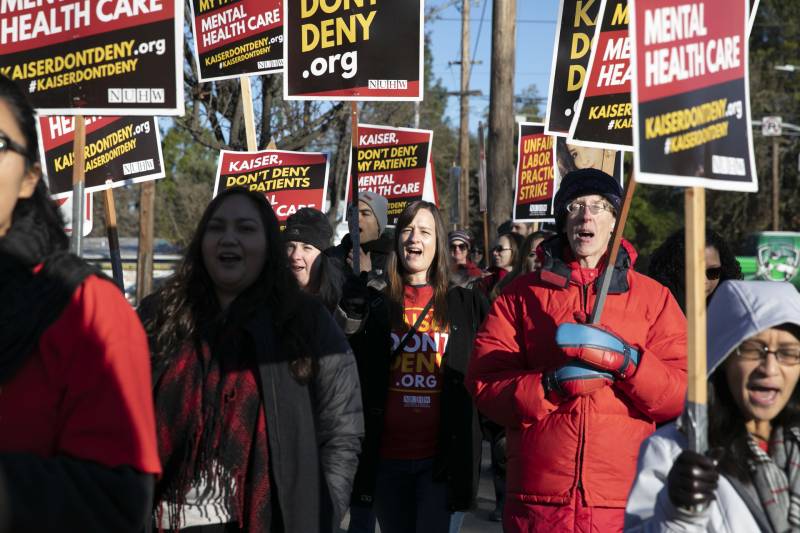In a letter sent Sunday to the Department of Managed Health Care, which regulates health plans, the union asked the department to ensure that Kaiser continues providing mental health care to patients during the strike, rather than canceling appointments.
Amanda Levy, deputy director for health policy and stakeholder relations for the Department of Managed Health Care, said the department is continuing to monitor access to services for patients impacted by the strike.
“The law requires health plans provide enrollees with medically necessary care within timely access and clinical standards at all times, which includes during an employee strike,” she said in an emailed statement.
Despite growing efforts at the state level to enforce mental health parity laws, Kaiser mental health practitioners say they still struggle to provide adequate and timely care for patients.
Sarah Soroken, who has worked as a therapist at Kaiser Fairfield for six years, said access to treatment has worsened during her time there. She said the pandemic has aggravated the situation, with more patients seeking care, even as more therapists are leaving.
“Right now we’re at a crisis point,” she said. “Things are worse than ever.”
Kaiser is not the only provider facing a shortage of mental health practitioners. Complaints of shortages also have been raised by counties, school districts and non-profit organizations around the state. Artz said some Kaiser providers are being recruited to work at telehealth start-ups, where money is good and work-from-home options abound. Others are entering private practice.
The union says the rate at which mental health clinicians are leaving Kaiser nearly doubled in the past year, with 668 clinicians leaving between June 2021 and May 2022, compared to 335 clinicians the previous year. In a union survey of 200 of those departing clinicians, 85% said they were leaving because their workload was unsustainable or because they felt they did not have enough time to complete the work, and 76% said they were unable to “treat patients in line with standards of care and medical necessity.”
Some of these concerns are not new, although the pandemic has exacerbated them.
In 2013, the Department of Managed Health Care fined Kaiser $4 million for failure to provide adequate mental health treatment.
In a hearing this spring, lawmakers raised concerns about the state’s plans to move an additional 200,000 Medi-Cal members onto Kaiser, given problems with mental health treatment. Democratic Sen. Scott Wiener of San Francisco has introduced a bill to significantly increase fines for health plans that fail to comply with state laws.
Another bill of Wiener’s, SB 221, which took effect July 1, is intended to ensure patients don’t face long delays for follow-up treatment through commercial providers like Kaiser. Specifically, the new law, which was sponsored by the union, requires that patients receive follow-up mental health care within 10 business days unless a provider determines that a longer wait will not be detrimental to the patient.
At a virtual press conference in late June, Kaiser mental health practitioners said the health giant wasn’t close to meeting those requirements.

